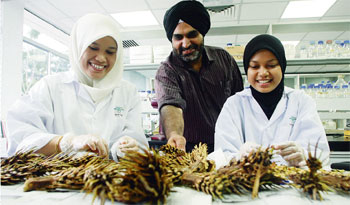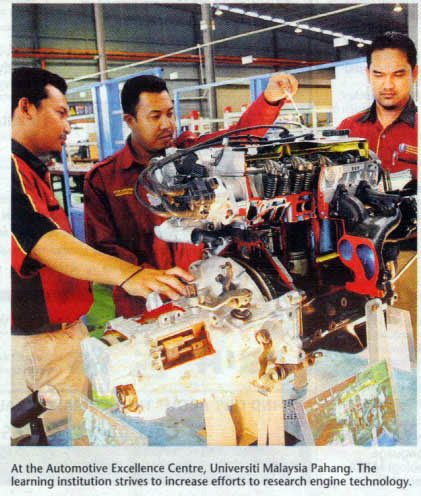Challenges of higher education
Professor Tan Sri Dato' Dzulkifli Abd Razak
Learning Curve : Perspective
New Sunday Times - 12/20/2009
THE 2009 Global Higher Education Forum jointly organised by the Higher Education Ministry and Universiti Sains Malaysia (USM) last week took off with a bang marked by the keynote and opening speech by Minister Datuk Seri Mohamed Khaled Nordin.
The speech created tremendous impact on the conference themed Recent Trends, Future Directions, which covers issues of regionalism and harmonisation, the influence of the economic crisis, as well as future relevance and scenarios of higher education.
In his speech, Mohamed Khaled elaborated on five important topics -- challenges in transforming higher education; issues which have impacted it; the nature of authority in tertiary institutions; cooperation versus competition and commercialisation of research.
He began by noting that the changing global climate has transformed tertiary education in several ways -- the acceleration in mass education; the shift from education as moral imperative towards education as economic utility; the emergence of commercial aspects of research and the continuing imposition of liberal market-led ideologies on how education is currently conceived and organised.
A striking characteristic of global higher education today is the reluctance to articulate and address the purpose and meaning of tertiary education.
The prevailing discourse seems resigned to a preset agenda which is narrowly instrumental.

Quoting the 2009 Global Education Digest by United Nations Educational Scientific and Cultural Organisation, he enumerated a number of issues, including the decline in infrastructure unable to cope effectively with the growing number of students; a significant diminution of the standing and status of academics; an emphasis on the vocational dimensions of higher education, and a decisive shift away from collegial forms of governance towards distinctively managerial methods, among others.
Mohamed Khaled also noted the greater corporatisation of higher education moving towards the status of bureaucratic corporation, as mentioned by Alfonso Cabal in his book The University as an Institution Today (with the subtitle Topics for Reflection).
In the same breath, he mentioned that the central figure of the university has shifted from the professor to the administrator, and places the logic of accountability -- defined by standardised procedures -- at the heart of the workings of the academy.
Some of these developments have led to a sense of detachment and loss of control, according to Anthony Smith of Oxford University.
Tertiary institutions are now regarded as a "place of work" rather the "community of scholars", which had previously motivated many people to choose academia as their vocation.
Moreover, the mechanisms for governance have shifted towards corporate form.
Mohamed Khaled cautioned that universities and colleges must ultimately be led by academics and not professional administrators and managers if "we are committed to the pursuit of knowledge and its attendant benefits".
Using the example of notable learning centres such as Plato's Athen, the 10th century Baghdad period under the Buyids, and later David Hume's Edinburgh in the 18th century, Mohamed Khaled reminded forum attendees that higher education has benefited greatly from collaboration rather than competition.
Citing David Ford of Cambridge University: "Education is transgenerational. It takes place best in the context of arrangements that have been developed, tested and adjusted over generations.
"The intellectual values that are at the heart of education and research are long-term ideals and practices.

"The thriving of those intellectual values is intrinsically linked to the quality of 'collegiality'.
"As these socially embedded values aim at knowledge and understanding that are cumulative, and in principle, unlimited in breadth and depth, they are served best by long-term collegial settings dedicated to their practice."
He then added that if the pursuit of "collegiality" is a value worth striving for, then the international alliances that have been generated should benefit a "community of scholars", particularly in the context of the south-south dialogue in global higher education in Asia, Africa and Latin America.
In the light of the financial rewards of commercialising new technologies and the enthusiasm for collaboration with industry, Mohamed Khaled highlighted that such keenness often fail to take into account the specific social, political and economic factors integral to these successes.
We often forget that these attainments often had very little to do with the notion of achieving commercial success as a direct result of research and development.
In fact, it can be argued that the innovative spirit integral to these efforts reflected the ethos of doing research for its own sake.
In summary, Mohamed Khaled has ably put forward new and old concerns that continue to plague higher education beyond the current hysteria of quality.
Unless these fears are properly understood and contextualised, it is difficult to imagine how the transformational process can happen.
Mohamed Khaled's speech is in all an eye-opener and we commend him for his boldness.
* The writer is the Vice-Chancellor of Universiti Sains Malaysia. He can be contacted at vc@usm.my
Learning Curve : Perspective
New Sunday Times - 12/20/2009
THE 2009 Global Higher Education Forum jointly organised by the Higher Education Ministry and Universiti Sains Malaysia (USM) last week took off with a bang marked by the keynote and opening speech by Minister Datuk Seri Mohamed Khaled Nordin.
The speech created tremendous impact on the conference themed Recent Trends, Future Directions, which covers issues of regionalism and harmonisation, the influence of the economic crisis, as well as future relevance and scenarios of higher education.
In his speech, Mohamed Khaled elaborated on five important topics -- challenges in transforming higher education; issues which have impacted it; the nature of authority in tertiary institutions; cooperation versus competition and commercialisation of research.
He began by noting that the changing global climate has transformed tertiary education in several ways -- the acceleration in mass education; the shift from education as moral imperative towards education as economic utility; the emergence of commercial aspects of research and the continuing imposition of liberal market-led ideologies on how education is currently conceived and organised.
A striking characteristic of global higher education today is the reluctance to articulate and address the purpose and meaning of tertiary education.
The prevailing discourse seems resigned to a preset agenda which is narrowly instrumental.

Malaysian Palm Oil Board employees in the laboratory in Bangi, Selangor. The changing global climate has escalated the emergence of commercial aspects of research.
Quoting the 2009 Global Education Digest by United Nations Educational Scientific and Cultural Organisation, he enumerated a number of issues, including the decline in infrastructure unable to cope effectively with the growing number of students; a significant diminution of the standing and status of academics; an emphasis on the vocational dimensions of higher education, and a decisive shift away from collegial forms of governance towards distinctively managerial methods, among others.
Mohamed Khaled also noted the greater corporatisation of higher education moving towards the status of bureaucratic corporation, as mentioned by Alfonso Cabal in his book The University as an Institution Today (with the subtitle Topics for Reflection).
In the same breath, he mentioned that the central figure of the university has shifted from the professor to the administrator, and places the logic of accountability -- defined by standardised procedures -- at the heart of the workings of the academy.
Some of these developments have led to a sense of detachment and loss of control, according to Anthony Smith of Oxford University.
Tertiary institutions are now regarded as a "place of work" rather the "community of scholars", which had previously motivated many people to choose academia as their vocation.
Moreover, the mechanisms for governance have shifted towards corporate form.
Mohamed Khaled cautioned that universities and colleges must ultimately be led by academics and not professional administrators and managers if "we are committed to the pursuit of knowledge and its attendant benefits".
Using the example of notable learning centres such as Plato's Athen, the 10th century Baghdad period under the Buyids, and later David Hume's Edinburgh in the 18th century, Mohamed Khaled reminded forum attendees that higher education has benefited greatly from collaboration rather than competition.
Citing David Ford of Cambridge University: "Education is transgenerational. It takes place best in the context of arrangements that have been developed, tested and adjusted over generations.
"The intellectual values that are at the heart of education and research are long-term ideals and practices.

"The thriving of those intellectual values is intrinsically linked to the quality of 'collegiality'.
"As these socially embedded values aim at knowledge and understanding that are cumulative, and in principle, unlimited in breadth and depth, they are served best by long-term collegial settings dedicated to their practice."
He then added that if the pursuit of "collegiality" is a value worth striving for, then the international alliances that have been generated should benefit a "community of scholars", particularly in the context of the south-south dialogue in global higher education in Asia, Africa and Latin America.
In the light of the financial rewards of commercialising new technologies and the enthusiasm for collaboration with industry, Mohamed Khaled highlighted that such keenness often fail to take into account the specific social, political and economic factors integral to these successes.
We often forget that these attainments often had very little to do with the notion of achieving commercial success as a direct result of research and development.
In fact, it can be argued that the innovative spirit integral to these efforts reflected the ethos of doing research for its own sake.
In summary, Mohamed Khaled has ably put forward new and old concerns that continue to plague higher education beyond the current hysteria of quality.
Unless these fears are properly understood and contextualised, it is difficult to imagine how the transformational process can happen.
Mohamed Khaled's speech is in all an eye-opener and we commend him for his boldness.
* The writer is the Vice-Chancellor of Universiti Sains Malaysia. He can be contacted at vc@usm.my
